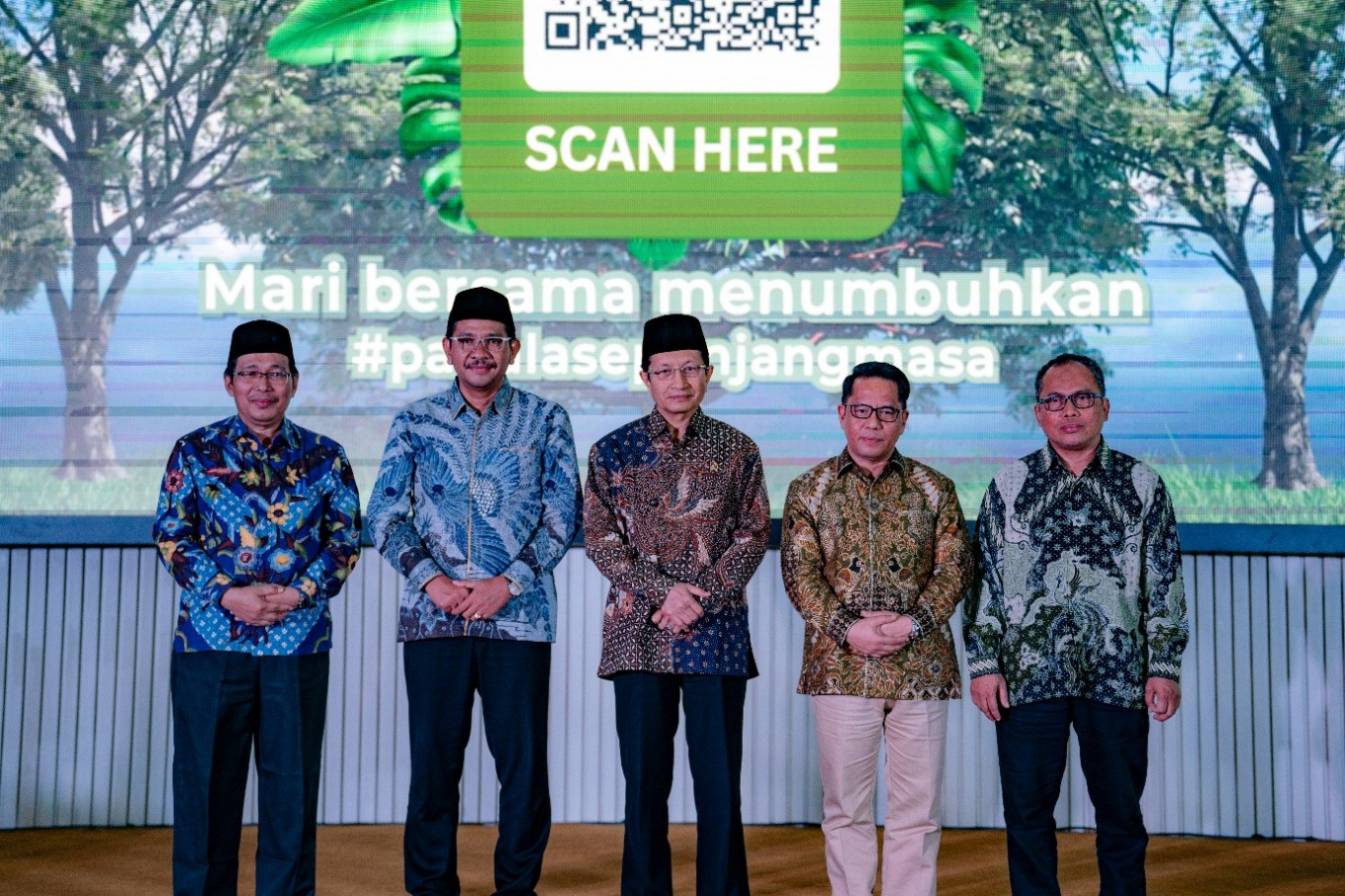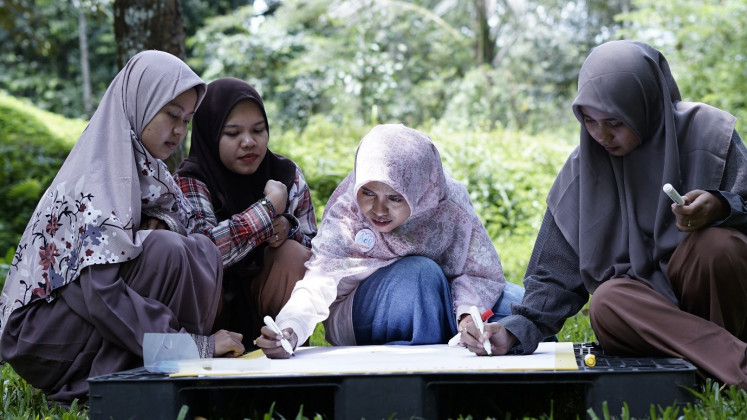Popular Reads
Top Results
Can't find what you're looking for?
View all search resultsPopular Reads
Top Results
Can't find what you're looking for?
View all search resultsReligious leaders seen as most trusted climate messengers, Purpose survey finds
Change text size
Gift Premium Articles
to Anyone
A
s part of sustainable efforts to strengthen and drive climate action in Muslim-majority Indonesia, global social impact agency Purpose conducted a survey on the perception and attitude of Indonesian Muslims on climate issues. The results revealed several significant insights, including their perception of religious leaders as the most trusted climate messengers.
Purpose carried out the quantitative survey in August-September 2024 involving 3,000 Muslims nationwide in partnership with YouGov, an international research, data and analytics group. Over the same period, the agency also performed a qualitative study among nearly 100 Islamic leaders in collaboration with Tenggara Strategics, a business and investment research and advisory institute.
Michelle Winowatan, Impact Strategy and Partnerships Lead at Purpose, explained the surveys aimed to find out “how Muslim communities perceive climate [issues], and to understand what motivates and blocks them from taking climate action”.
The surveys were closely linked to Purpose’s Islamic Climate Movement program in Indonesia, which includes initiatives like Umat untuk Semesta (Ummah for the Universe), Sedekah Energi (Charity for Energy), and Forest Waqf launched three years ago, and to tackle climate action challenges, especially funding.
“In having this information, we hope we can craft a better engagement strategy that can lead to bolder climate action and policies,” said Michelle.
She pointed to Purpose’s Sedekah Energi and Forest Waqf initiatives as two examples of community-driven financing mechanisms for climate solutions.
“Through these initiatives, we hope to demonstrate an alternative climate financing mechanism, which has been a bottleneck for progress in climate policy,” she said.
“We want to deepen our understanding about the Muslim community in Indonesia so we can engage with them more productively.”
Purpose’s Sedekah Energi is a community-driven mosque solarization initiative that uses the sedekah (voluntary almsgiving) model.
“So far, we’ve been able to facilitate the solarization of three mosques, with one on the ways, using this model, ” said Michelle.
“Through Sedekah Energi, we hope to raise awareness as well as increase demand for renewable energy at the community level. In the end, we hope this initiative can inspire policies that can accelerate renewable uptake in Indonesia.”
Michelle said that through its surveys, Purpose was able to gather insights into what people thought about such initiatives, what would encourage their participation in such programs, and what would discourage them from taking part.
“These insights are really helpful for us in fine-tuning our projects so they can reach more people,” she said.
Bengkel Hijrah Iklim (BHI) 3.0, in which we conducted capacity building for young preachers to introduce them to the climate crisis, Just Energy Transition, and the actions they can take as Islamic leaders in their respective communitiesPurpose identified five crucial insights from the study.
First, employment, health, poverty, education and human rights are the top five issues and environmental or climate issues rank sixth, indicating a gap between actual and perceived urgency of climate change.
Second, religious leaders are the most trusted climate messengers among Indonesian Muslims, followed by environmental activists and the government.
Unfortunately, religious leaders are rarely engaged in climate discourse. This needs to change, as they are well positioned to speak to and inspire action from Muslim communities.
Third, renewable energy is strongly supported. Eighty-four percent of respondents support the adoption of renewable energy, such as solar, wind and hydro energy, in part because they believe these conform to Islamic teachings on environmental preservation.
Fourth, there is low awareness about the just energy transition (JET), with just 15 percent of respondents aware of JET. This indicates a significant information gap in the promotion of renewable energy and sustainable practices.
Fifth is a general preference for individual actions compared to community initiatives. In addressing climate issues, respondents prefer individual actions like reducing trash and saving energy (56 percent) to community-based initiatives (41 percent). A mere 3 percent of respondents do not take any action.
Highlighting the second crucial insight, about religious leaders as trusted messengers of climate information, Michelle noted: “this finding is a highly valuable insight, because most of the climate initiatives in Indonesia have yet to involve religious leaders”.
“It shows that climate actors need to broaden their horizons and work with nontraditional allies like religious leaders in order to reach a broader audience. This way, we might break out of the echo chamber and finally move the needle on the climate,” she said.
“We believe that religious leaders are crucial climate allies. They have an audience that trusts them, and they have the capabilities to speak to their audience in a way that resonates deeply with them. We think it is important to engage and work with religious leaders in spreading climate messages to the Indonesian audience”
For example, da’wah (religious lectures) could be a strategic tool for Muslim leaders.
“However, not many Islamic teachers are using this platform to talk about climate [issues]. We believe that if climate can be a prevalent topic during Friday sermons, pengajian (Koran recitations) or other Islamic forums or spaces, we might see some monumental changes in our climate action,” said Michelle.
She also highlighted that 80 percent of respondents supported the transition to renewable energy, a key action to combat climate change. “However, this support is not currently translated into political cover who can enable or push policymakers to invest in climate solutions.”
“According to Climate Action Tracker, Indonesia’s climate policies, actions and targets are critically insufficient. This shows that there is a gap between what the public wants and what policymakers are doing. Climate campaigners need to help make this support more visible, so it can influence the government to take bolder and more ambitious climate actions,” she said.
The survey also identified four main audience segments: Climate Caliphs (41 percent), Eco-Hijrah Community (24 percent), Aspiring Ummah (23 percent) and Responsible Netizen (9 percent).
The key takeaway for Purpose from this segmentation was that each group “is at a different point in their spiritual as well as climate journey. Everyone has a role to play, and it is the task of climate campaigners to activate these audiences based on what they are able to contribute”, Michelle said.
“The most important thing is to know your audience, tailor your message to speak to their hopes, needs and desires, and craft suitable calls to action for each audience.”












